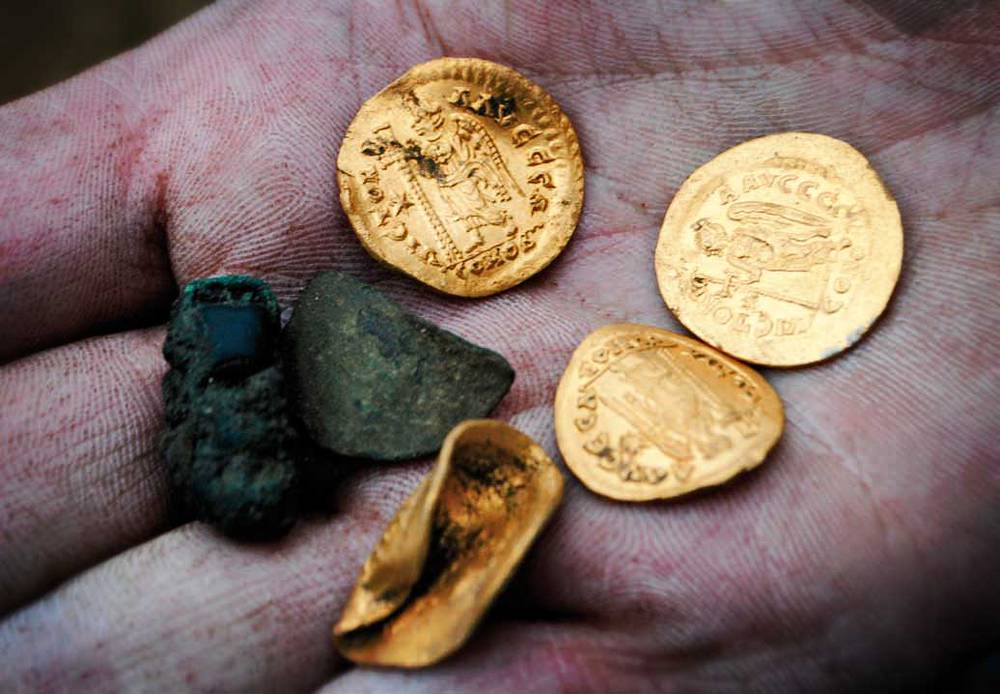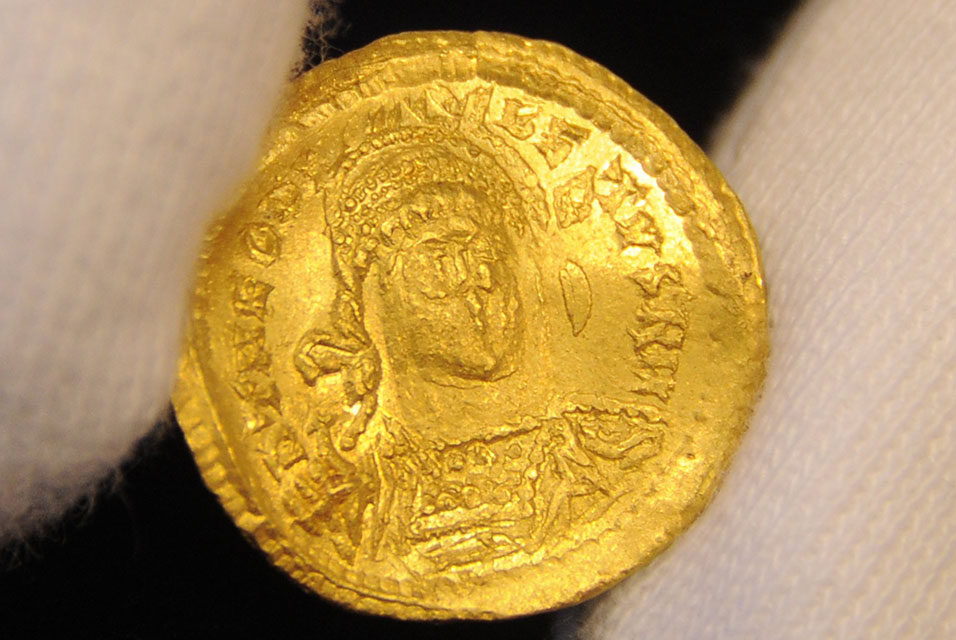
A group of amateur archaeologists working under the guidance of professional archaeologists discovered eight 6th century gold coins in a potato field near Biesenbrow in Uckermark, northeast Germany, last November. The treasure is composed of seven Byzantine solidi and an extremely rare coin bearing an image of the Merovingian King Theudebert I (reigned 533-548 A.D.). The coins are thin and bent, weighing around 4.4 grams each. The standard weight of solidi was 4.5 grams, so despite their bent and curled appearance, they’ve managed to stay remarkably intact.
The area has had a reputation for buried treasure ever since 200 coins from Rome and Constantinople were discovered there in the 19th century, the first appearing in 1851. Four of them are now in the Numismatic Collection of the State Museums of Berlin. Some of the lesser coins were given away, and the rest of the gold coins were all melted down by the farmer who owned the property. The find wasn’t well documented at the time. Biesenbrow village teacher W. Dalichow (we don’t even know his first name) wrote an account of the find in 1885 for the Brandenburg Provincial Museum in Berlin, but historians have questioned Dalichow’s accuracy.

Color him vindicated, because it was from Dalichow’s correspondence that archaeologists were able to figure out which potato field to search. In a letter, Dalichow mentioned the name of the farmer who found the coins and from there historians were able to figure out where that farm once was. Archaeologist Felix Biermann pinned down an area of 400 by 800 meters (1312 feet by 2625 feet) as the likeliest spot. He took a group of volunteers with metal detectors who had been trained in excavation work, and it was one of them who saw the first glint of gold just four inches underground. A retired actor and teacher found the King Theudebert coin.
The discovery is of major historical significance. The coins themselves, first of all, are rare and valuable. By the 6th century, only the Byzantine Roman emperor had the right to strike gold coins with his face on them. It was against the law to use them outside of the Byzantine empire. All taxes had to be paid in solidi and once collected, the emperor melted them down every year and minted new ones. This ensured that the soft pure gold pieces didn’t get whittled down to chips through heavy circulation. If the coins were taken out of the empire, then they weren’t going to be paid as taxes and the whole imperial system of gold recycling and preservation would falter. Of course the solidi ended up traveling anyway.
How they traveled to the Brandenburg area in around 550 A.D., we do not know. At that time, the area was a wasteland. The Germanic tribes had left the area during the early Migration period (starting in 400 A.D.) while the Slavs had yet to move in. The Frankish Kingdom of Austrasia was on the other side of today’s Germany, covering parts of Belgium, Luxembourg and the Netherlands. King Theudebert I, grandson of King Clovis, was initially an ally of Byzantine Emperor Justinian I when he attempted to reconquer the Western Empire from the Ostrogoths in 535. Justinian paid Theudebert for his assistance, and then wound up fighting him when the Franks saw the Gothic War as a perfect opportunity to get some prime northern Italian real estate of their own.
Theudebert’s minting of coins with his own image rather than the emperor’s was in keeping with his increasing prominence in Western politics. He was the first Merovingian to issue his own characteristic coinage rather than pay homage to the emperor, and it was a direct insult to Justinian. Theudebert even wore the pearl-bedecked crown of the Byzantine emperor on his coins. Constantinople was concerned that Theudebert would seek to expand his kingdom even beyond Italy at Byzantine expense.

Historians speculate that the entire coin cache — these eight coins are believed to be part of the same treasure that was first uncovered in the 19th century — was buried by Thuringian warriors on the run after losing battles against the Franks.

